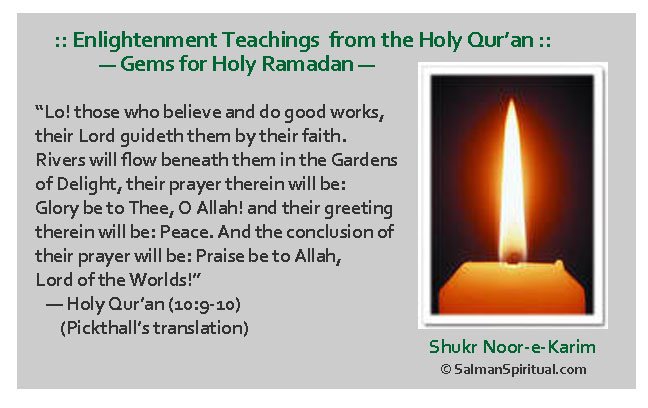

"A messenger reciting unto you the revelations of Allah made plain, that He may bring forth those who believe and do good works from darkness unto light." — Holy Qur'an 65:11
:: Trait No. 7: The Dā'īs Distinguish Between Doubt and Certainty ::
Wednesday,
Dec. 31, 2025
Bismillahir Rahmanir Rahim
In the name of Allah, the Most Beneficent, the Most Merciful.
Ya Ali Madad and Ramadan Mubarak. This post consists of five parts
Part 1: Enlightenment Teachings from the Holy Qu'ran

Part 2: An excerpt from 'A Code of Conduct—A Treatise of the Etiquette of the Fatimid Ismaili Mission'
In 'al-Risāla al-mūjaza al-kāfiya fī of Ahmad b.Ibrāhīm al-Naysbūrī has written the following gem:
"[§10] God said: 'Who is better in speaking than he who appeals to God, does what is righteous and says, "Most certainly I am a Muslim."'16 This verse explains that there is no position in this world and the next, better and more glorious than that of those who summon to God, and that a condition of the da'wa is that it comes with appropriate actions. If a person has not done righteous acts, he is not suited to be a dâ'î. If a person does not renounce the association with God of other things, and does not affirm the absolute Oneness of Him, does not understand well the declaration of that Oneness but rather continues to compare God to created beings, he cannot be a dâ'î. It is as our lord the Commander of the Believers, may the blessings of God be upon him and on the imams among his offspring, said: 'Dâ'îs in religion distinguish between doubt and certainty'. Distinguishing between doubt and certainty is to separate truth from falsehood. It is possible that he intended it to be between the literal exterior and the inner meaning. Someone who does not know the true and certain, how can he distinguish doubt from certainty, the truth from falsehood? The dâ'î must know the difference between truth and falsehood, so that he can distinguish one from the other, lest he judge the false to be true, and true to be false, and have them accept this judgment from him, leading thereby to the corruption of the da'wa. "
(Source: Klemm, V. and Walker, P. E., A Code of Conduct—A Treatise of the Etiquette of the Fatimid Ismaili Mission, p.40)
Footnotes
16. Qur'an, 41:33
Part 3: Dhikr Tasbi
Let us perform the dhikr of 'Ya Ali Mowla Ali':
Bismillahir Rahmanir Rahim
In the name of Allah, the Most Beneficent, the Most Merciful
Ya Ali, Mowla Ali
O Light of Eternal Ali, O Noor Mowlana Shah Rahim Al-Hussaini Hazar Imam
Al-hamdu lillahi rabbil 'alamin.
Praise be to Allah, the Lord of the worlds!
Part 4. Angelic Salwat
Let us recite angelic salwats to invoke Divine grace and mercy.
Bismillahir Rahmanir Rahim
In the name of Allah, the Most Beneficent, the Most Merciful
Allâhumâ salli alâ Muhammadin wa âle Muhammad:
O Allah! Bestow Peace on and through Muhammad and his Descendants
or
Al-hamdu lillahi rabbil 'alamin.
Praise be to Allah, the Lord of the worlds!
Part 5. Ardent Global Prayers
O Noor Mowlana Hazar Imam: bless the global Jamat with spiritual and luminous tayid (help) to advance materially, spiritually and intellectually; and create sunshine in our hearts and bless all of us with the inner vision of the Truth.
Haizinda — Qayampaya
(Our Present Imam is Living and His NOOR is Eternal)
Traits of an Ismaili Dai